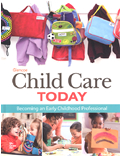
Child Care Today ©2012Chapter 4: Child Development PrinciplesChapter SummaryChild development is a pattern of changes that occurs throughout childhood. Physical development describes the ways a child’s body grows and what all the body can do. It includes large motor skills, small motor skills, and balance and motor coordination. Intellectual development describes how children think, communicate, make decisions, and solve problems. It includes sensory skills, language, concepts, and thinking skills. Emotional development takes place as children form feelings about themselves and others. It includes temperament, trust and attachment, identity and self-esteem, and self-control. Social development builds as children learn how to get along with others. It includes family and peer relationships. Researchers have a body of knowledge about how children develop. Much of the research is divided into environmental influences and hereditary influences. Children develop in predictable patterns and stages. There are five general principles of child development. All areas of growth and development are affected by the growth and function of the brain. Sensory and repeated and related experiences help children learn. Different parts of the brain develop at different times. Each child progresses through developmental stages at his or her own rate. Types of development include sequential and interrelated. Heredity is set before birth and is unchangeable. Environment after birth changes regularly. Prenatal development that can affect a child includes the mother’s health before birth, prenatal drug use by the mother, and the birth process. Proper health and nutrition can also affect development. Children need to be nurtured by parents, guardians, and other special adults. Children at risk of not properly developing have a wide range of characteristics. Early intervention and prevention can help children maintain proper development. Parents can be educated to help nurture development in their children. Early childhood professionals can offer referrals for support services to families that need help. |  |















